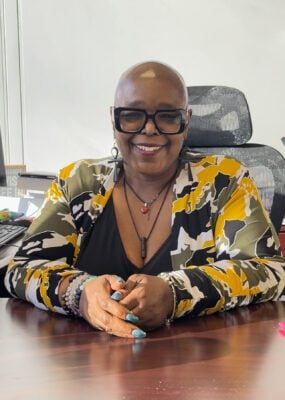Angelia Moore is in her second year as the president of the IPS school board. The Indianapolis Recorder sat down with Moore to talk about her priorities for the current session and how families and residents within the IPS district can make sure their voices are heard.
This Q&A has been edited for length and clarity.
What can parents and families do to make their voices heard right now? Especially those who may not be able to go to an IPS school board meeting in person, how can they get their voices heard?
Moore: I think the easiest thing they can do is that we accept written public comment for every board session. They can send those in at any time. There’s a cutoff at 4 o’clock on the day of the meeting, but we (collect) them ongoing. Also, they can reach out to commissioners directly. Each of us have an email that they can find at myips.org.
“…if we don’t hear from you, we can’t advocate for your desires.”
~ Angelia Moore
What is it that you want families to know right now? What are your priorities for this session?
Moore: Understanding what the legislators are asking of us, which is how to figure out our resource-sharing, our property tax-sharing (and) solving locally what they need to be solved at the state level is critical, but hearing from all parents is what is essential to us.
If we only hear from one set of parents, we will only have one comment to balance and so hearing from all parents, regardless if your child is in a school that’s affiliated with the district or not. If you’re in this district’s boundaries and you have voted, we want to know what you think.
Can you explain what you mean by ‘all parents’?
Moore: Right now the landscape of education in Indianapolis (includes) the traditionally managed schools with staff that’s hired by the district, innovation schools which are in partnership in some way with the district and then we have independent charters who have charters with one of the (authorizing) entities – the city the state or one of the universities, and we have public education individuals.
Even if you’re not a parent, if you are concerned about what happens we need to know because if we don’t hear from you, we can’t advocate for your desires.
“…I want everyone to have the same access to choice and what works best for their kiddos as I did.”
~ Angelia Moore
What’s in this for you? Why do you care what happens to the students?

Moore: I think what’s important to me is I know our next greatest is in this city and making sure that I have their voice and their best interest at heart and at hand is important. I am at the end of my own personal children’s journey so when these laws pass, my son will have graduated, but I want everyone to have the same access to choice and what works best for their kiddos as I did. Making sure that that is done and done well is what makes this important to me.
Is there anything else you would like to say right now?
Moore: I just want people to understand that we are reachable and accessible, and we are willing to carry this for them. We just need to know what they need us to carry.
“…I do want the students that are inside of this district in public education to know that they do have a voice.”
~ Angelia Moore
How would you like this to be resolved? How would you like the families, legislators and board commissioners to work together to resolve the issues?
Moore: We know that there’s a shortage in education. One of our school partners to the north asked for any student want to come to come (to their school) because they know there were dollars attached to it.
I don’t want our students to be seen as dollars, but I do want the 42,000 students that are inside of this district in public education to know that they do have a voice.
For more information about upcoming IPS school board meetings and how to contact the commissioner in your area, visit myips.org.
Contact Editor-in-Chief Camike Jones at camikej@indyrecorder.com or 317-762-7850.
Camike Jones is the Editor-in-Chief of the Indianapolis Recorder. Born and raised in Indianapolis, Jones has a lifelong commitment to advocacy and telling stories that represent the community.








